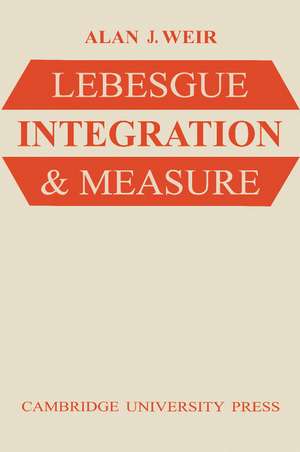Lebesgue Integration and Measure
Autor Alan J. Weiren Limba Engleză Paperback – 9 mai 1973
Preț: 488.80 lei
Preț vechi: 603.45 lei
-19% Nou
Puncte Express: 733
Preț estimativ în valută:
93.55€ • 96.92$ • 78.07£
93.55€ • 96.92$ • 78.07£
Carte disponibilă
Livrare economică 25 februarie-03 martie
Livrare express 15-21 februarie pentru 59.22 lei
Preluare comenzi: 021 569.72.76
Specificații
ISBN-13: 9780521097512
ISBN-10: 0521097517
Pagini: 296
Ilustrații: 1
Dimensiuni: 152 x 229 x 17 mm
Greutate: 0.48 kg
Editura: Cambridge University Press
Colecția Cambridge University Press
Locul publicării:Cambridge, United Kingdom
ISBN-10: 0521097517
Pagini: 296
Ilustrații: 1
Dimensiuni: 152 x 229 x 17 mm
Greutate: 0.48 kg
Editura: Cambridge University Press
Colecția Cambridge University Press
Locul publicării:Cambridge, United Kingdom
Cuprins
Preface; 1. The completeness of the reals; 2. Null sets; 3. The Lebesgue integral on R; 4. The Lebesgue integral on Rk; 5. The convergence theorems; 6. Measurable functions and Lebesgue measure; 7. The spaces Lp; Appendix: the elements of topology; Solutions; References; Index.
Recenzii
'The book is easy to read, partly because of the treatment adopted, and partly because of the quality of the exposition. Dr Weir's style is clear, friendly and informal; he shows how the results fit in with the reader's intuition; he highlights the important things and warns of the difficult things (these warnings when a hard bit is coming up are most confidence-preserving). He does not aim at maximum generality at the cost of understanding. The examples are chosen with care, many of them being, in effect, lemmas that will be needed later in the proofs of theorems.' Mathematical Gazette














